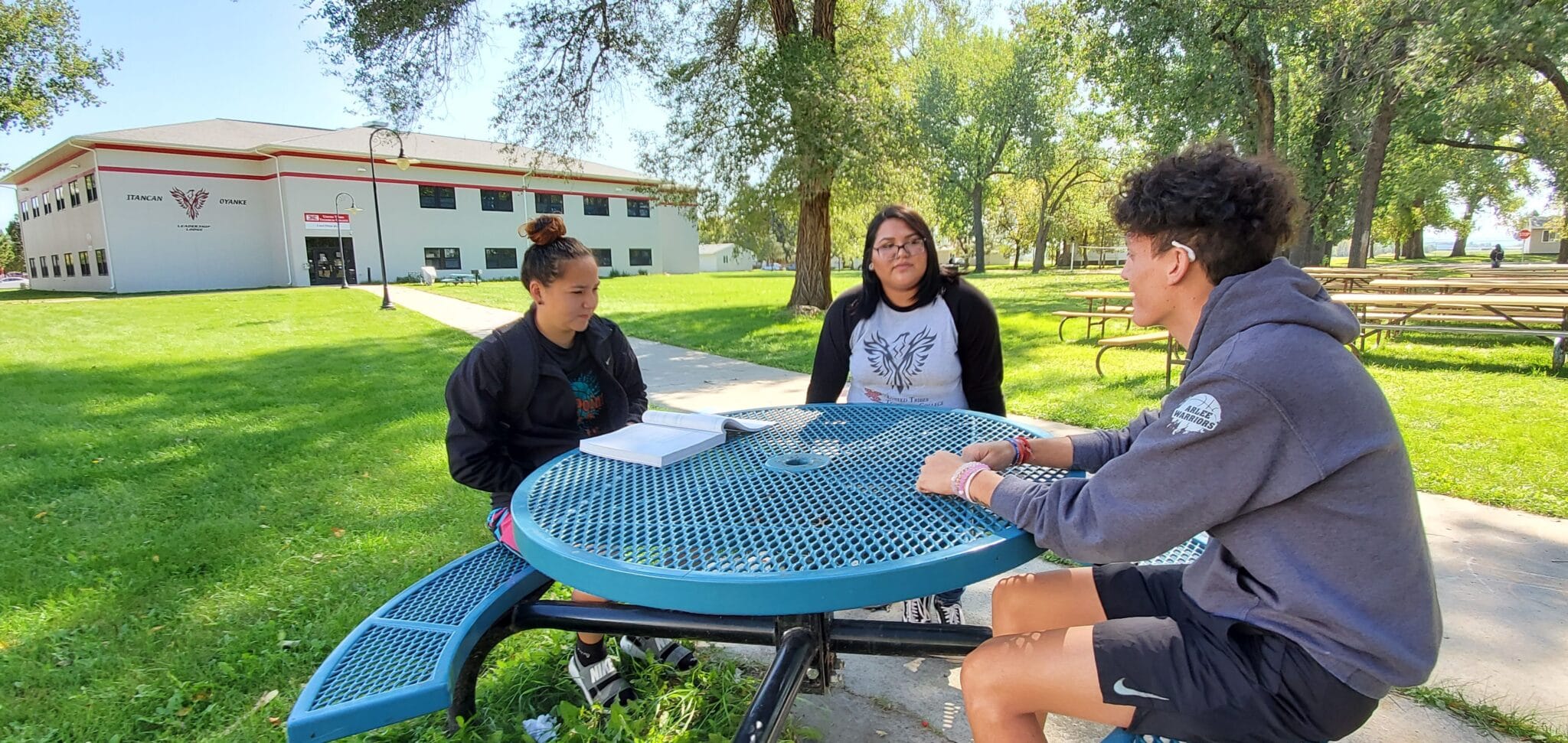The excitement was palpable at the Achieving the Dream (ATD) TCU Holistic Student Supports Review and Sustainability Workshop hosted at Nueta Hidatsa Sahnish College (NHSC) in North Dakota in April. “It’s us that must lift us up,” stated Dr. Twyla Baker, president of NHSC, in her opening remarks. “We must find the path to get our tribal students to succeed.”
Along with representatives from ATD, the American Indian Higher Education Consortium (AIHEC), and the American Indian College Fund, six Tribal Colleges and Universities (TCUs) participating in ATD’s Serving Native American Students with Holistic Student Supports (SNASHSS) project gathered in person for the first time since DREAM 2020. The event was the culmination of a three-year grant where colleges gathered to share success stories and plan for the future. During the day-and-a-half workshop, the six TCUs shared their impressive student support advancements and developed plans for the next phase — sustaining, institutionalizing, and building on the work accomplished.

Celebrating success
For the past three years, participating TCUs, with support from ATD coaches, have worked diligently to set their vision and implement strategic action plans to improve the first-year student experience, new-student orientation, financial aid, advising, student retention, progress tracking, and other measurable aspects of student success.
All six participants made significant reforms on these areas:
- Fond du Lac Tribal and Community College deployed and adapted a case management/early alert platform, rebranded as “North Star,” to proactively identify and resolve student challenges that might have otherwise impeded academic progress. The platform is also inspiring faculty and staff to provide “kudos” for work well done to strengthen motivation and momentum among all students. FDLTCC is finding the process facilitates an integrated approach to student success across academic affairs and student affairs, including logging and sharing of notes about student interactions, to ensure consistent guidance and support for students.
- Iḷisaġvik College focused their efforts on improving first-year student success by redesigning their first-year program and new-student orientation. The college also formed an enrollment management team that sought to shift the college’s thought process from asking, “Are our students college-ready?” to “Is our college student-ready?”
- Nueta Hidatsa Sahnish College underwent a fundamental paradigm shift and redefined the college’s mission statement with broad college-wide input. The shift kicked off with a revamped online new-student orientation by packaging it with their existing semester-long, one-credit student success course.
- Stone Child College focused its efforts on redesigning its academic advising by creating a co-advising model that equips faculty and staff volunteers with training, program-specific study plans, and protocols to effectively conduct first-year student advising. The goal is for the co-advisors to begin advising new students earlier (in the summer) and then hand them off to their faculty advisor for career- and program-specific counseling.
- United Tribes Technical College designed and implemented a new-student intake survey that invites new students to articulate their strengths, potential challenges, and other perspectives of interest to the college. With these insights in place, UTTC advisors can home in on the needs of each individual student and be proactive in addressing them.
- White Earth Tribal and Community College incorporated a student service approach reflective of the tribe’s culture and environment by engaging tribal elders to redesign the Academic Improvement Plan (AIP) program. The program has been so well received that access to the content has been extended to all White Earth students. Another top priority was to form the College Senate, bringing together members of the faculty senate, student senate, and cabinet, along with department representation to address top institutional issues.
Getting change to stick and sustain
Ensuring these approaches become embedded into the fiber of the institution was the focus of the final part of the workshop. Event facilitators and ATD coaches used exercises that prompted the group to analyze and reshape mental models surrounding top challenges, while maximizing cross-institutional collaboration to help solve each college’s most pressing issues. At the conclusion of the workshop, participants left with an approach and concrete steps to sustain change at their colleges across all levels.
“It is so important for these connections and conversations to occur in the environment where the work needs to be done,” Dr. Karen A. Stout, president CEO of Achieving the Dream, said during the convening. “There was so much powerful learning at this event.”
A toolkit to support TCU student success
Currently, the United States is home to 37 accredited TCUs. One key component of the SNASHSS project is to share transformational successes across all TCUs. To that end, ATD is working with the six colleges in this group on a TCU-specific Holistic Student Support Toolkit incorporating best practices, key learnings, and relevant successes from this project.
About the Serving Native American Students with Holistic Student Supports project
Six Tribal Colleges and Universities (TCUs) participate in the Serving Native American Students with Holistic Student Supports (SNAHSS) project focused on transforming the student experience through a holistic student supports redesign. Through this engagement with Achieving the Dream, the TCUs receive customized coaching, subgrants, and opportunities to engage with the others in the cohort as a community of practice to strengthen their capacity to better serve students in their communities. Learn more about ATD’s role in supporting student success at TCUs.


